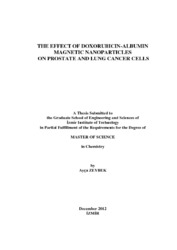Please use this identifier to cite or link to this item:
https://hdl.handle.net/11147/3529Full metadata record
| DC Field | Value | Language |
|---|---|---|
| dc.contributor.advisor | Şanlı Mohamed, Gülşah | - |
| dc.contributor.author | Zeybek, Ayça | - |
| dc.date.accessioned | 2014-07-22T13:51:44Z | - |
| dc.date.available | 2014-07-22T13:51:44Z | - |
| dc.date.issued | 2012 | - |
| dc.identifier.uri | http://hdl.handle.net/11147/3529 | - |
| dc.description | Thesis (Master)--İzmir Institute of Technology, Chemistry, İzmir, 2012 | en_US |
| dc.description | Includes bibliographical references (leaves: 46-51) | en_US |
| dc.description | Text in English; Abstract: Turkish and English | en_US |
| dc.description | ix, 57 leaves | en_US |
| dc.description.abstract | Chemotherapy is a major therapeutic approach for treatment of a wide range of cancers. But unfortunately, this therapeutic approach has got a lot of side effects on healthy tissues as well as cancerous cells. Although doxorubicin is one of the most potent and widely used anticancer drugs, it has some side effects on healthy tissues, as well. Therefore, most researchers have studied various doxorubicin carrier systems for targeted delivery. For this purpose, doxorubicin loaded magnetic albumin nanospheres (M-DOX-BSA-NPs) were synthesized. The main objective of this project was basically to determine the cytotoxic, apoptotic and cell cycle effects of BSA-NPs, M-BSA-NPs, DOX, BSA-DOX-NPs and M-DOX-BSA-NPs against prostate and lung cancer cells and compare them. Beside this, it is aimed to understand how cells look like before and after giving doxorubicin and M-DOX-BSA-NPs by using optical microscopy and compare them. Another objective of this project was to determine where M-DOX-BSA-NPs reach out into the cell by using concofal microscopy; and to explore proteins’ differentiations between control groups and lung and prostate cancer cells in which DOX and M-DOX-BSA-NPs were applied, by proteomic studies. In this study, the experimental results which were also supported by literature findings, demonstrated that M-DOX-BSA-NPs were more toxic than free doxorubicin, and this complex was more effective for prostate cancer cells than lung cancer cells. As a result of this study, it was determined that this complex was synthesized as a target chemotherapy drug delivery system. Accordingly, this complex may affect to other cancer types, and it can be carried out by new drug designers and treatments. | en_US |
| dc.language.iso | en | en_US |
| dc.publisher | Izmir Institute of Technology | en_US |
| dc.rights | info:eu-repo/semantics/openAccess | en_US |
| dc.subject.lcsh | Cancer cells | en |
| dc.subject.lcsh | Albumins | en |
| dc.subject.lcsh | Chemotherapy | en |
| dc.subject.lcsh | Nanoparticles--Magnetic properties | en |
| dc.subject.lcsh | Doxorubicin | en |
| dc.title | The Effect of Doxorubicin-Albumin Magnetic Nanoparticles on Prostate and Lung Cancer Cells | en_US |
| dc.type | Master Thesis | en_US |
| dc.institutionauthor | Zeybek, Ayça | - |
| dc.department | Thesis (Master)--İzmir Institute of Technology, Chemistry | en_US |
| dc.relation.publicationcategory | Tez | en_US |
| dc.identifier.wosquality | N/A | - |
| dc.identifier.scopusquality | N/A | - |
| item.openairecristype | http://purl.org/coar/resource_type/c_18cf | - |
| item.languageiso639-1 | en | - |
| item.openairetype | Master Thesis | - |
| item.grantfulltext | open | - |
| item.fulltext | With Fulltext | - |
| item.cerifentitytype | Publications | - |
| Appears in Collections: | Master Degree / Yüksek Lisans Tezleri | |
Files in This Item:
| File | Description | Size | Format | |
|---|---|---|---|---|
| T001056.pdf | MasterThesis | 1.82 MB | Adobe PDF |  View/Open |
CORE Recommender
Page view(s)
232
checked on Mar 31, 2025
Download(s)
82
checked on Mar 31, 2025
Google ScholarTM
Check
Items in GCRIS Repository are protected by copyright, with all rights reserved, unless otherwise indicated.